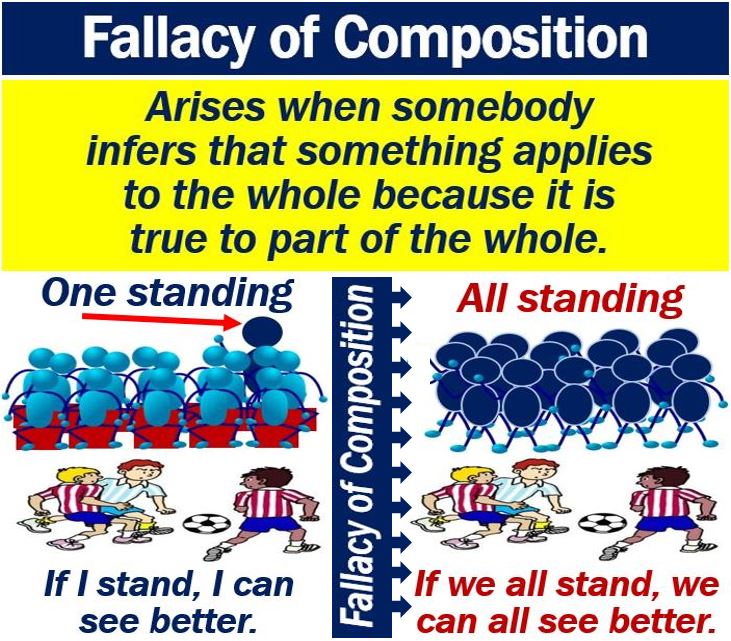What is fallacy of composition? Definition and examples
Fallacy of Composition exists when somebody assumes that what is true for one part of the economy is true for the whole economy. Critical thinking and careful analysis are essential to avoid the oversimplified reasoning of the fallacy of composition.
We can use the term for segments of the economy, members of a group, and parts of a whole. For example, fallacy of composition arises when somebody assumes that something is true for the group because it is true for one individual.
Fallacy of division works the other way round. Fallacy of division arises when we infer that something is true for a part of the whole because it is true for the whole.
Study.com has the following definition of the term:
“The fallacy of composition arises when an individual assumes something is true of the whole just because it is true of some part of the whole.”
A “Fallacy” is a deceptive error in reasoning, leading one to incorrect conclusions based on unsound arguments.
In the world of investing, we sometimes have to make assumptions. However, fallacies of composition when trading securities can be costly and even dangerous.
Securities are financial instruments such as bonds or company shares.

Fallacy of composition or division
-
Fallacy of composition – example
Peter is in a sports stadium watching a soccer match (UK: football match). The stadium is full. Peter knows that if he stands up, he can get a better view of the players.
If he assumed that everybody would see better when everybody stood up, he would be wrong. If everybody got up, many people would be blocking other spectators’ view.
His mistake is a fallacy of composition. He is inferring that something is true for everybody just because it is true for one person.
Some fallacies of composition are clearly wrong, i.e., anybody with common sense would never infer so incorrectly.
For example, we know that if a runner in a race runs faster, he or she can win. Therefore, if every runner in the race runs faster, they can all win.
That is impossible because there is only one winner in a race.
-
Fallacy of division
Jane is American. She lives in Chicago. Her friend, Nico, is Japanese. Nico lives in Tokyo.
Nico is coming to visit Jane in Chicago next week. Jane knows that Americans, on average, are fatter than Japanese people. Therefore, Jane assumes that Nico will be thinner than she is.
However, Jane’s assumption might not be accurate. Nico might be fatter, thinner, or have the same BMI (body mass index) as Jane.
Jane’s assumption might be is a fallacy of division.
Similarly, broad policies based on such fallacies may fail to address the diverse needs of a population, leading to ineffective or counterproductive outcomes.
Example sentences
Below you can see how we use the term “fallacy of composition” in a sentence:
- “The CEO’s strategy was flawed by a fallacy of composition, presuming that increasing productivity in a single department would enhance the entire company’s efficiency.”
- “The market analyst’s report was criticized for a fallacy of composition by projecting a single industry’s growth trends onto the whole economic sector.”
- “In logic class, we learned that the fallacy of composition is the mistake of applying characteristics of parts to the whole.”
- “The city’s traffic plan failed due to a fallacy of composition, assuming what eased congestion on one road would work city-wide.”
- “Debating, I pointed out my opponent’s fallacy of composition when he claimed one politician’s views represented the entire party’s stance.”
- “To avoid the fallacy of composition, one must critically assess whether individual success stories truly translate to the group’s experience.”
Video – What is Fallacy of Composition?
This video, from our YouTube partner channel – Marketing Business Network, explains what ‘Fallacy of Composition’ means using simple and easy-to-understand language and examples.

